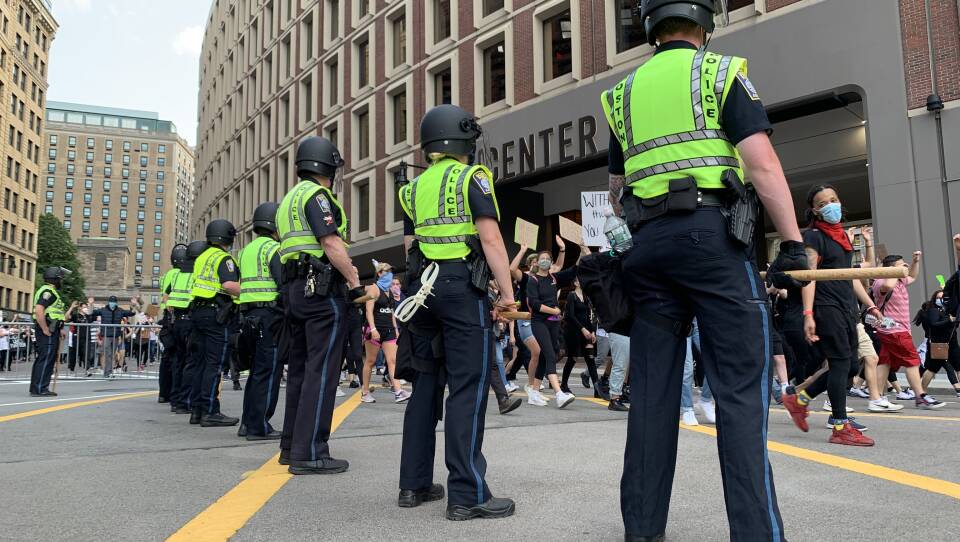In the aftermath of the Black Lives Matter protests of 2020, there was lots of talk from Boston’s leaders about implementing real systemic change in the city’s police department, to hold bad actors accountable and address long-standing issues of racism and inequality.
But just over a year later, much of that talk about action has shifted to the back burner, at least according to members of the Boston Police Reform Task Force .
On Wednesday’s Boston Public Radio, two members of that group, Jamarhl Crawford and Tanisha Sullivan, highlighted the dwindling momentum within the city’s new Office of Police Accountability and Transparency , or OPAT. Crawford is an activist, community organizer and editor of the publication Blackstonian . Sullivan, meanwhile, is the president of the Boston branch of the NAACP .
One glaring bit of evidence supporting their case is the lack of any promotion for a public meeting, scheduled for Thursday, where OPAT Executive Director Stephanie Everett will address her program’s progress in the months since their January founding. The meeting was announced Monday, though GBH staff was unable to find any evidence of its existence online, including on the city of Boston’s public notices page .
More Local News
“We should be shouting this from the rooftops,” said Crawford. “Folks in the city should know that there is a major police reform meeting coming up tomorrow from OPAT that is supposed to talk about what they’ve done so far, what the new visions are and all that.”
GBH was able to get the agenda for the meeting, which will take place from 5:30 until 6:30. A link to watch the meeting remotely can be found here .
Reached for comment, multiple officials from the city of Boston did not have an answer as to why the meeting wasn't publicly listed online.
Sullivan and Crawford's conversation was preceded by their recently-published open letter in DigBoston, addressed to mayoral finalists Michelle Wu and Annissa Essaibi-George. The letter called on the two to better address the slow implementation of a series of recommendations submitted by the task force to then-Mayor Marty Walsh in October of 2020.
“We are not satisfied with the progress of implementation and in some instances, believe our recommendations have been incorrectly applied,” they letter said.
Speaking to hosts Jim Braude and Margery Eagan, Sullivan noted that the timeline proposed by the task force “set an expectation that all of the reforms would be well on their way to implementation no later than six months following the law going into effect. Which would’ve brought us to June of 2021.”
She added, “we are well past that timeline, and that is where I think most of us as task force members do have concern.” She emphasized a hope that “whoever ends up being elected our next mayor will really prioritize implementing all of the reforms that were signed into law earlier this year.”
Up to this point, while both candidates have expressed an interest in bettering the Boston Police Department, Sullivan said she’s been left wanting more.
“On this issue, both candidates have provided soundbites,” she said. “Neither of them have really explained why they have taken the policy position that they have, and how they believe that policy position is going to help advance public safety throughout the city of Boston.”
Reflecting on why the two candidates are focusing their attention elsewhere, Crawford pointed to a recent Suffolk University/Boston Globe poll that found just four percent of respondents listed police reform as the most important issue to be addressed. Racism and inequality charted higher on that list, though it still fell behind schooling and housing.
"It was amazing to me," he said. "Just a year ago, things [were] burning, [police reform was] the number one subject, there’s turmoil in the streets... and then all of a sudden it goes to the number one or two issue, now to the back."









